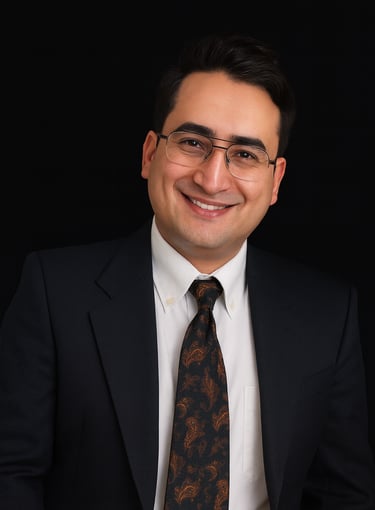An Storyteller: PhD Candidate in Political Science | MS Candidate in Data Science
Ali Amini is a Ph.D. candidate in Political Science at the School of Public Affairs and an M.S. candidate in Data Science in the Department of Mathematics and Statistics at American University in Washington, D.C. As a student of social science, with a background in mathematics, he uses frontier AI and a range of computer science tools, from classical machine learning to newer algorithms, to understand and hopefully help solve a tiny fraction of human problems in the social sciences and in interdisciplinary projects related to human health and the environment.
His dissertation, Three Essays on AI and Political Behavior, uses frontier AI to advance political science methodology. Ali's dissertation committee is evenly represented by famous political behaviorist and methodologist. Professor David Barker (Chair) and Professor Jan Leighley, both current or former NSF program directors, represent the political behavior side, while Professors Jeff Gill and Ryan Moore bring methodological expertise. His work on applying computer science paradigms to survey research earned him the Burns “Bud” Roper Fellow Award from the American Association for Public Opinion Research (AAPOR) in 2025.
His scholarship has been presented in APSA, APPOR, MPSA, SPSA, Data Science Frontiers (NYU) and published in prestigious outlets including Nature journals as well as peer-reviewed edited volumes with Springer, Elsevier and World Scientific. He is driven by stories reflected in cities: From international physics tournaments (IPT) in Warsaw to the UN Charter grounds in Hiroshima, from chairing and presenting in climate change panels in San Juan to exploring youth civic engagement at Lugano’s MEM summer summit, to presenting cutting-edge generative AI at NYU’s Data Science Frontiers, a singular truth emerged for him: we are here for humanity. Driven by this unique lived transcending philosophy, he seeks to harness artificial intelligence not as an end, but as a lens to deepen our understanding and protection of human life on Earth. His work reflects a philosophy where academic efforts pursue truth in service of humanity, bridging disciplines in service of our shared human story.


Center for Data Science
American University
3590 Nebraska Ave NW
Washington, DC 20016
© 2024. All rights reserved.
